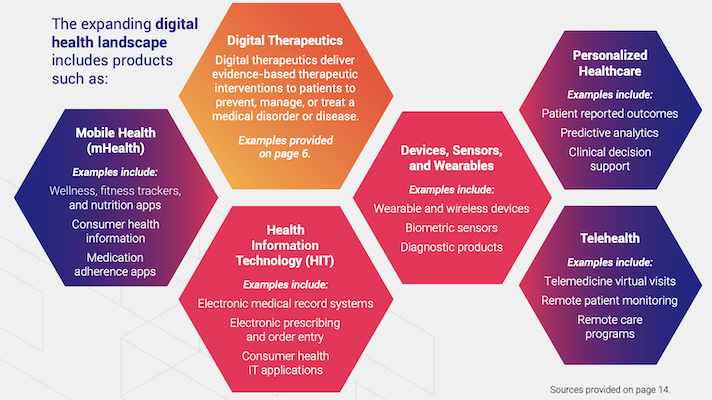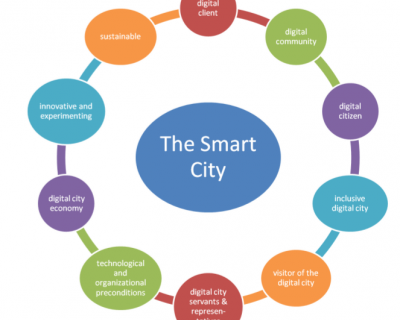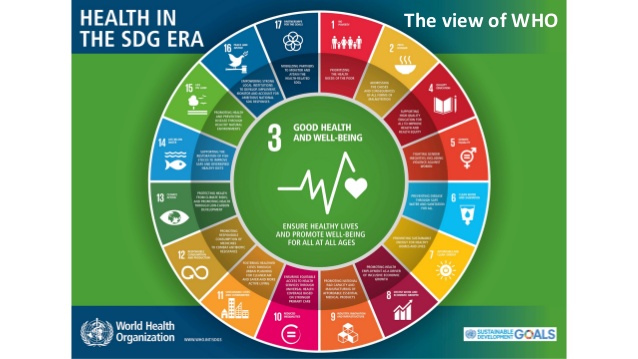As #CES2019 kicks off in Las Vegas with today’s first Media Day, the Consumer Technology Association presented its forecast on the 5 Technology Trends to Watch in 2019 — and they all play into health, wellness, and medical care.
The five trends are:
- Artificial Intelligence on the Rise
- Envisioning the Smart Home of the Future
- Digital Health Tech Empowers Patients
- Esports and Sports Technology, and
- Smart Cities Promote Resilience.

Here are how these five mega-trends can bolster our health and healthcare products and services over the next decade.
AI is indeed on-the-rise in healthcare: as I have begun planning my agenda for #HIMSS19 convening next month in Orlando, I’m struck by the number of surveys already released on the adoption of AI among healthcare providers, payors and suppliers. Whether for drug discovery, preventing hospital readmissions, making sound human resource decisions, or addressing population health challenges, Big Data are flowing into more cognitive systems to mine information and inform clinicians’ decisions at the point of care and researchers’ ongoing search for better treatments.
For my own work and world at the intersection of consumers/patients + technology + health, I’m keen to learn how AI can scale that kind of knowledge to the consumer at home for self-care. I’ve had this discussion with various AI innovators and I can say this is coming to the N of 1 sooner rather than later for some lower-hanging fruit applications — like personalized nutrition plans based on our own genetic make-ups, or exercise routines that can help boost metabolism. Call this the emergence of more personalized self-care (vis-à-vis personalized “medicine).
Our homes are also getting smarter in light of growing options for Internet of Healthy and Medical Things. In this scenario, I’m thinking beyond the traditional connected home categories of more efficient energy usage, home security, or optimizing a washing machine (as laudable as these applications may be). For me, I’m looking at the ecosystem for the home health hub, like a smart fridge connected to Alexa connected to my car. I’ll be writing about this later in the week, so stay tuned. For my take on this last year at #CES2018.
 #3 trend is digital health empower patients – obviously a direct focus on healthcare. In the fine print of the CTA forecast, the trend ties to digital therapeutics, eliminating friction, and augmented reality (AR). The former can be thought of as software-as-medicine, and the Digital Therapeutics Alliance (yes, there’s now an industry association for the field) illustrates their broad definition of the concept in the diagram here.
#3 trend is digital health empower patients – obviously a direct focus on healthcare. In the fine print of the CTA forecast, the trend ties to digital therapeutics, eliminating friction, and augmented reality (AR). The former can be thought of as software-as-medicine, and the Digital Therapeutics Alliance (yes, there’s now an industry association for the field) illustrates their broad definition of the concept in the diagram here.
Eliminating friction in health care is a huge and frustrating challenge, big because we have all kinds of data “opportunities” to mine but frustrating because of the lack of interoperability (we health care wonks’ word for “computer don’t talk to each other”). Innovations like the Veteran’s Administration’s Blue Button initiative and Humetrix’s fantastic work on helping make health data more liquid are addressing this trend.
Dr. Brennan Spiegel is one innovative physician, at UCLA, who has been making the case for adopting augmented reality in patient care. I closely track his research and suggest you do, too, as there is a growing body of evidence for using AR to help patients and make healthcare better — a key pillar in the Triple/Quadruple Aim in improving health care to enhance the experience for both patients and providers, drive health care outcomes, and lower per capita costs.
Esports and sports technology will have direct impacts of wellness and patient care, alike. The fitness benefits of eSports have been evident since physical therapists began using Nintendo Wii in PT and rehab settings. But increasingly, these technologies also have import for using exercise-as-medicine for both physical and mental health applications.
 Finally, we come to smart cities to promote resilience. My work in the European Union has informed my view on this innovation, which has direct application to public and individual health. This diagram of “the smart city” comes out of an EU project Gartner worked on to identify characteristics and success factors for smart cities in Europe. Take note, especially, of a few concepts that aren’t so familiar in the U.S., such as the digital citizen, digital community, or digitally inclusive city.
Finally, we come to smart cities to promote resilience. My work in the European Union has informed my view on this innovation, which has direct application to public and individual health. This diagram of “the smart city” comes out of an EU project Gartner worked on to identify characteristics and success factors for smart cities in Europe. Take note, especially, of a few concepts that aren’t so familiar in the U.S., such as the digital citizen, digital community, or digitally inclusive city.
 Health Populi’s Hot Points: CNBC report Chrissy Farr asked today on Twitter, “We’ve spent billions of dollars on digital health in the past decade to make us healthier in the past decade… So why aren’t we any healthier?”
Health Populi’s Hot Points: CNBC report Chrissy Farr asked today on Twitter, “We’ve spent billions of dollars on digital health in the past decade to make us healthier in the past decade… So why aren’t we any healthier?”
I responded via tweet, “Cause #health is made at home, work, play, schools & faith via #SDOH esp investing in #education & #nutrition. Helps to have #healthinsurance too. Tech can help to scale but generally not directly impactful on #publichealth or individual N’s of 1.”
#SDOH is the hashtag for “Social Determinants of Health.” These are the building blocks for a healthy life, such as education, access to and consumption of nutritious food, transportation, clean air and water, safe neighborhoods, financial security, and access to health care services.
But medical care in and of itself cannot overcome or decrease the risks that a person’s lack of access to the SDOHs pre-bake into human health from pre-natal care onward.
I would add a further social determinant without which people can’t self-care in the modern era: that is access to broadband connectivity. In the U.S. we are currently wrestling with net neutrality as well as disparities in Americans’ universal access to connectivity. Without that, health disparities will persist. That’s why I asked you to ponder the EU concepts of “digital citizen” and “digital inclusivity.” This issue is addressed in my book on health care consumers which will be published later this year.
CTA’s 5 Tech Trends for 2019 are hopeful for health because they can help scale SDOH’s to people where we live, work, play, pray and learn.
Stay tuned all this week for my daily updates on #CES2019 here on Health Populi and on Twitter @HealthyThinker.
The post What #CES2019 5 Tech Trends to Watch Mean for Health/Care appeared first on HealthPopuli.com.
What #CES2019 5 Tech Trends to Watch Mean for Health/Care posted first on http://dentistfortworth.blogspot.com
No comments:
Post a Comment